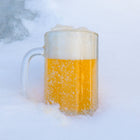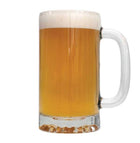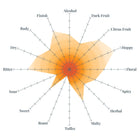Product Details
This complex and hoppy brew will help you to navigate the doldrums of seemingly never-ending winters. Developed with the pioneering spirit of American brewers, this White IPA recipe melds old-world tradition with the hoppy boldness of an American IPA.
At first glance, this beer is as white as a frozen tundra, but upon closer scrutiny, tall drifts of American hop flavor and aromas abound. A traditional witbier grain bill and yeast strain coupled with West Coast American IPA hops yields a wonderfully complex India White Ale beer kit. A slight spice and tartness from the yeast intermingling with citrus notes from abundant hop additions compliment the silky smooth body created by flaked oats and unmalted wheat. Stay frosty my friends!
Permafrost White IPA Brewing Notes:
- Style: White IPA
- Fermentation Range: 62 - 72°F
- Original Gravity: 1.065
- SRM: 4.5
- IBU: 80
- ABV: 6.7%
White IPA Tasting Notes:
- Aroma: Hop forward with aromas of orange and grapefruit citrus, passion fruit, and slight floral notes. Soft malt profile of freshly baked bread interwoven with a moderate phenolic yeast nose.
- Appearance: Light golden in color with moderate to high yeast haze creating a nearly opaque beer. Brilliant white, dense, and lasting foam head.
- Flavor: Bready and slightly grainy malt flavor. High bitterness and high citrus, floral, and tropical fruit hop flavors. Medium-low spicy phenolic and fruity esters present from fermentation with a touch of tartness.
- Mouthfeel: Medium body with a creamy, pillowy mouthfeel and moderate dryness.
Looking for the All-Grain Version?
Additional Information
| SKU | B10150 |
| Beer Color | Light |
| Original Gravity | 1.065 |
| Total Time to Make | 6 weeks |
| Regional Style | USA |
| Alcohol Content | Medium |
| Yield | 5 Gallons |
| Beer Style | IPA, White IPA |
| Fermentation Type | Ale |
| Beer Recipe Kit Instructions |
|
Notes from Brad, Northern Brewer Head Brewer:
“Before the New England-style hazy IPA, there was the White IPA. This beer style came about in a harmonious fusion of old-world brewing tradition with new-age American craft brewing ingenuity. This “hybrid” style begins with what may look like a familiar witbier grain bill but amped up beyond traditional proportions. Along with classic American 2-row malt, the grist is comprised of a fair portion of wheat ingredients as well as a smattering of flaked oats. Pairing both wheat malt and unmalted wheat with the barley and oats lends a silky smooth character to the beer while also maintaining a light color to really let this beer stand out in the glass. The witbier-inspired grain foundation then sets the stage for other influences to make their mark - specifically a hopping schedule most closely resembling that of an American west coast IPA. Multiple additions of modern hop varieties including Centennial, Amarillo, and Galaxy deftly mesh to create firm bitterness and also leave the beer with a huge hop flavor and equally large exotic hop aroma. With the old having been combined with the new (ingredients and techniques alike), we again turn to the history books and ferment this sugary, hoppy elixir with traditional Witbier ale yeast. This is the proverbial icing on the cake, as this yeast provides more witbier flavor influence to the resulting beer, but also supports the hop character in convincing fashion to create a truly satisfying mish-mash of beer styles.
Some may find this beer aggressively bitter at over 80 IBU, so if you feel like you would like to tone it down a bit (~60 IBU) simply omit the very first Summit hop addition, and continue on with the recipe as otherwise written. Also, be aware of this yeast strain’s penchant for forming huge pillows of krausen during active fermentation. Since this yeast is such a notorious top-cropper, be sure to either ferment in a larger vessel than normal, employ the utility of a blowoff tube, or use a defoaming agent to help control the krausen. As an added twist, this beer would be terrific with a moderately high carbonation level just as its Witbier heritage would suggest. Adding a little more priming sugar or force carbonate at a slightly higher pressure to target ~2.7 to 2.9 volumes of CO2 will really make this beer shine. Three cheers for the original hazy IPA!”






